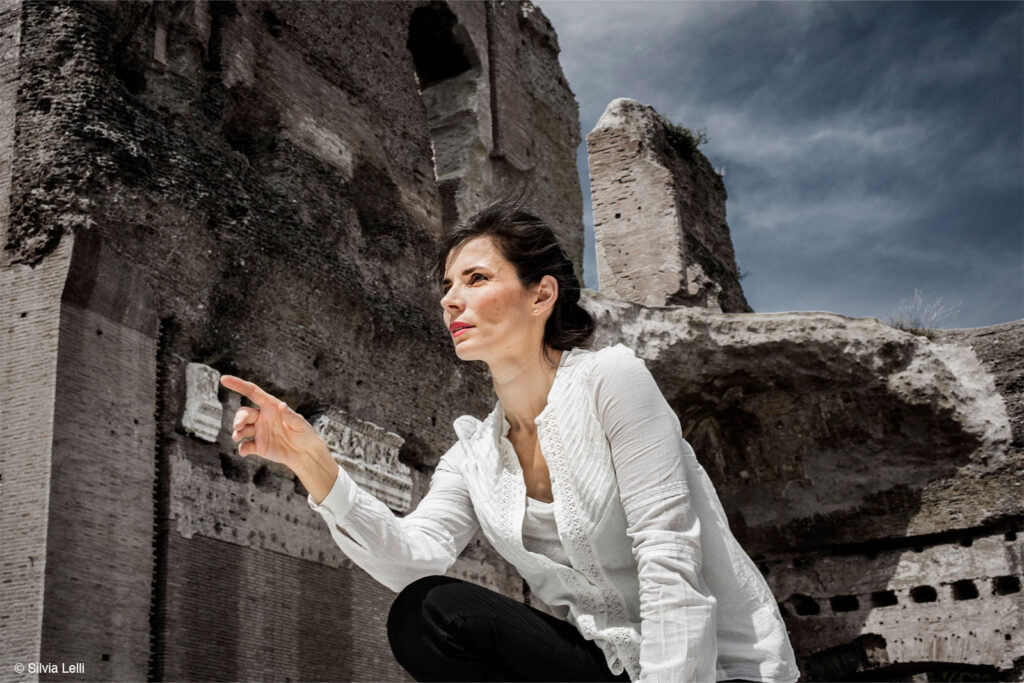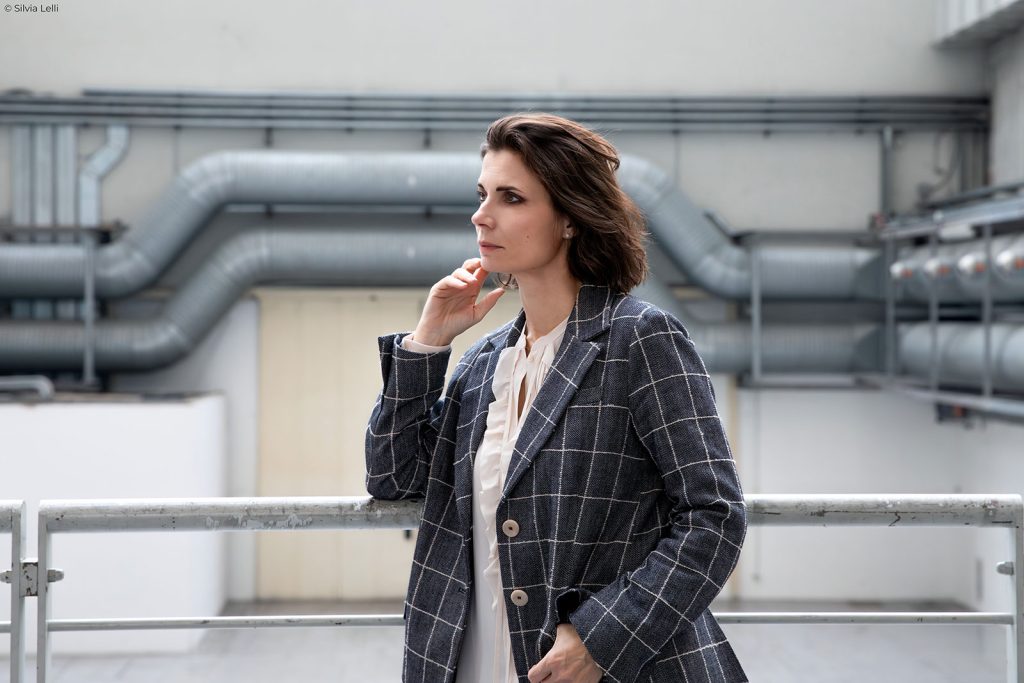Biography
Chiara Muti, actor and director, works in theater, cinema, and opera, collaborating with renowned international artists.
biography
Theater
Actor, playwright, and director, Chiara Muti trained at the Paolo Grassi School of
Dramatic Art and perfected her studies at the Piccolo Teatro di Milano, directed by
Giorgio Strehler. Since her debut in 1995 alongside Valeria Moriconi, she has been a
leading figure in major Italian festivals and theaters, alternating between great Classical
and contemporary authors. Some of her notable performances include Angelique in the
1995 production of Marivaux’s La madre confidente at Teatro Stabile delle Marche
directed by Franco Però, Giulia in Liliom by Ferenc Molnár in the 1996 production at
Teatro Due of Parma directed by Gigi Dall’Aglio, and the Chorus in the 1996
production at Teatro Stabile di Bolzano of Euripides’ Medea directed by Marco
Bernardi. In 1997, she performed alongside Franca Nuti and Giancarlo Dettori as
Iphigenia in Pablo Quintavalle’s Le Erinni directed by Mario Mattia Giorgetti at the
Manzoni Theater in Milan. In 1998, she played Lady Macbeth in Angelo Longoni’s
Macbeth Clan for the Piccolo Teatro di Milano, alongside Raoul Bova. In 2001, at
Teatro Biondo of Palermo, she performed as the Stepmother in Pirandello’s Six
Characters in Search of an Author directed by Maurizio Scaparro, alongside Carlo
Giuffré and Pino Micol. In 2004/2005, she portrayed Francesca da Rimini and Teresa
Guiccioli in Nevio Spadoni’s Ridono i sassi ancor della città directed by Elena Bucci
for the Ravenna Festival. From 2004 to 2006, she played Antigone in Antigone by
Sophocles by Bertolt Brecht, directed by Federico Tiezzi, a production by the
Lombardi-Tiezzi company. In 2014, she performed in Inoue Hasushi’s Il fucile da
Caccia directed by Piero Maccarinelli at the Teatro Valle in Rome.
As a singer-actress, she made her debut in 1995 in the role of Eurydice in L’Orfeo by
Claudio Monteverdi, directed by Micha Van Hoecke for the Ravenna Festival. She
formed an artistic bond with the Belgian choreographer and director, co-authoring and
performing three new Theater-Dance creations presented in world premieres at the
Ravenna Festival: Pèlerinage in 1997, alongside Alessio Boni, Salomé in 2008, based
on texts by Oscar Wilde, and, in 2009, Le Baccanti based on texts by Euripides,
alongside Pamela Villoresi. In 1996, she performed as Tatiana in Pushkin’s Eugene
Onegin with music by Prokofiev, for the Accademia Chigiana, and in 2000, she
performed Jeanne d’Arc au Bucher by Honegger for the closing concert of the Spoleto
Festival.

In 2007, she performed Weill’s Marie Galante at the Opera House in Rome, directed by Joseph Rochlitz, and Sherazade in the concert performance Le due Lune,
conducted by Damiano Giuranna for the Parco della Musica in Rome and the National Theatre of Algiers. Since 2008, she has lent her voice to the songs of Dante Alighieri, set to music in the Dante Symphony by Franz Liszt, conducted by Vittorio Bresciani for the Sagra Musicale Umbra and the Spring Festival in Budapest in 2015. In the same year, she performed as Elia in the eponymous opera by Giovanni Tamborrino for the Cathedral of Bari. For the Ravenna Festival, she performed Passiuni with music and texts by Giovanni Sollima, conducted by Riccardo Muti. In 2009, she performed
Debussy’s melodrama Le Martyre de Saint Sébastien with the Orchestre National
Montpellier conducted by Alain Altinouglou. Her fruitful collaboration with composer Azio Corghi led to four world premieres: Pia in 2005, based on texts by Marguerite Yourcenar, directed by Valter Malosti at the Teatro dell’Opera in Rome, Zerlina in Il Dissoluto Assolto in 2006, based on texts by José Saramago, directed by Andrea De Rosa at the Teatro Nacional de São Carlos in Lisbon, Giocasta in 2009, based on texts by Maddalena Mazzocut-Mis, directed by Riccardo Canessa at the Teatro Olimpico in
Vicenza, and Blanquette, the opening concert of the 71st edition of the Settimana
Musicale Senese, where she also performed L’Arlesienne by Alphonse Daudet, with
music by Bizet, conducted by Marco Angius. Since 2002, she has worked closely with
writer and director Ruggero Cappuccio, for whom she has been the lead performer in
Ludovico Ariosto’s L’Orlando Furioso with music by Paolo Vivaldi, in Desideri
Mortali in 2008, at the Teatro Massimo in Palermo, and in Natura Viva in 2010, with music composed by Marco Betta for the Maggio Musicale Fiorentino. In 2015, she performed as the female lead in the oratorio Apokàlypsis composed and conducted by
Marcello Panni for the Milan Expo at the Church of San Marco, alongside Elio de
Capitani. In 2024, for the symphonic season of the Teatro Comunale in Bologna, she performed the Silvia Colasanti’s melodrama Arianna, Fedra e Didone, based on texts from Ovid’s Epistolae Heroidum conducted by Oksana Lyniv. She has also performed R. Strauss’ Enoch Arden with pianist Emanuele Arciuli for the Petruzzelli Theatre
Foundation in Bari, J.A. Benda’s Medea with the Hager Trio for the Bologna Festival, Haydn’s Le ultime sette parole di Cristo sulla Croce with the Bernini and Cremona
quartets, and the concert reading Bach-Dante alongside pianist David Fray for the Les Athénéennes festival in Geneva in 2022.
biography
Cinema
She made her film debut in 1997 alongside Massimo De Francovich in Giancarlo
Planta’s Onorevoli Detenuti, followed by Egidio Eronico’s Il Guardiano in 1999
alongside José Quaglio, and Giulio Base’s La Bomba by with Vittorio and Alessandro
Gassman and Shelley Winters. In 1999, she starred with Valentina Cervi in La Via
degli Angeli by Pupi Avati. For her work alongside Stefania Rocca and Athina Cenci on the film adaptation of Remo Binosi’s L’attesa, Rosa e Cornelia directed by Giorgio Treves, she won the 2000 Grolla d’Oro for Best Actress. The same year, she starred in Elisabetta Marchetti’s Tempo Sospeso and Guido Chiesa’s Il Partigiano Johnny
alongside Stefano Dionisi at the Venice Film Festival. In 2002, she starred in the
musical Come se fosse Amore directed by Roberto Burchielli, in which she sings a duet with Gino Paoli. In 2006, she starred alongside Alejandro Jodorowsky in Franco
Battiato’s Musikanten and worked with Fabio Troiano in the comedy Good Bye Mister
Zeus, written and directed by Carlo Sarti. In 2007, she was the protagonist of Il sorriso
dell’ultima notte with Giovanni Esposito and Ciro Damiano, and in 2011 Rien Va
alongside Roberto Herlitzka and Lello Arena, both directed by Ruggero Cappuccio.
Also an accomplished television actress, in 1998 she starred in La casa Bruciata by Massimo Spano alongside Giulio Scarpati, and in 2007 in Testimone inconsapevole
and Ad occhi chiusi, episodes of the series L’avvocato Guerrieri by Gianrico Carofiglio, directed by Alberto Sironi, alongside Emilio Solfrizzi. For Rai Radio 2, she played Milady alongside Adriano Giannini in the new edition of The Three Musketeers by Alexandre Dumas, directed by Marco Parodi, and hosted the program Di tanti palpiti produced by Anna Rita Caroli on Rai Radio 3. In 1996, Chiara Muti won the Anna Magnani Award and in 1997 received an Honorable Mention at the Eleonora
Duse Award.

directing
Directing
In 2007, Muti made her directorial debut in Il Regno Di Rucken, a tribute she wrote and performed for the beloved Mozart at the Teatro di Salerno. Following her success, she wrote, directed, and performed Il Sogno Di Ludwig, a poetic journey on the troubled
relationship between Wagner and Ludwig of Bavaria, based on a reworking of the text
Finestra con le Sbarre by Klaus Mann for the Ravello Festival, both alongside pianist Paolo Restani. In 2010, she directed Cardo Rosso, a fresco on the conflict between Russia and Chechnya, based on texts by Maddalena Mazzocut-Mis and music composed and performed by cellist Giovanni Sollima for the Ravenna Festival. Since 2004, she has established a partnership with actress and director Elena Bucci, with whom she has co-directed three new creations: Folia Shakespeariana and Lumina in
Tenebris for the Ravenna Festival, and Due Regine, which explores the conflict
between Queen Elizabeth I and Mary Stuart, for the Pompei Theatrum Mundi. In 2023, alongside pianist David Fray, she wrote, directed, and performed L’Enfant Oublié, a work exploring the pain and acceptance of the loss of a child, produced and presented at the L’Offrande Musical festival in the Hautes-Pyrénées and at the Aix-en-Provence Festival in 2025.
In 2012, Chiara Muti made her opera directorial debut with Hindemith’s Sancta
Susanna conducted by Riccardo Muti at the Teatro Alighieri in Ravenna. In 2013, she directed Purcell’s Dido and Aeneas conducted by Jonathan Webb at the Teatro
dell’Opera di Roma, and Gluck’s Orfeo ed Euridice conducted by Balázs Kocsár at the Opéra National Montpellier. In 2014, she directed Puccini’s Manon Lescaut by conducted by Riccardo Muti at the Teatro dell’Opera di Roma. In 2016, she opened the season at the Petruzzelli Theatre in Bari with Mozart’s Le Nozze di Figaro conducted by Matthew Aucoin, and in 2018, she opened the season at the Teatro San Carlo in Naples with Mozart’s Così fan tutte conducted by Riccardo Muti. In 2021, she debuted
at the Maggio Musicale Fiorentino with Puccini’s Madama Butterfly conducted by Francesco Ivan Ciampa. In 2022, she directed Amorosa Presenza, a world premiere
opera written and directed by Nicola Piovani for the Teatro Verdi in Trieste, and
Mozart’s Don Giovanni conducted by Riccardo Muti at the Teatro Regio in Turin, thus concluding her survey of the Daponte Trilogy. In 2023, she directed Bellini’s I Puritani for the Bellini International Context at the Teatro Massimo in Catania, conducted by Fabrizio Maria Carminati, and in 2024, she made her debut at the Teatro alla Scala in Milan with Rossini’s Guillaume Tell conducted by Michele Mariotti. In 2025, she directs a new production of Handel’s Giulio Cesare conducted by Ottavio Dantone for the opening of the opera season at the Teatro Alighieri in Ravenna. In 2026, she will return to the Teatro Regio in Turin with Verdi’s Macbeth conducted by Riccardo Muti.


